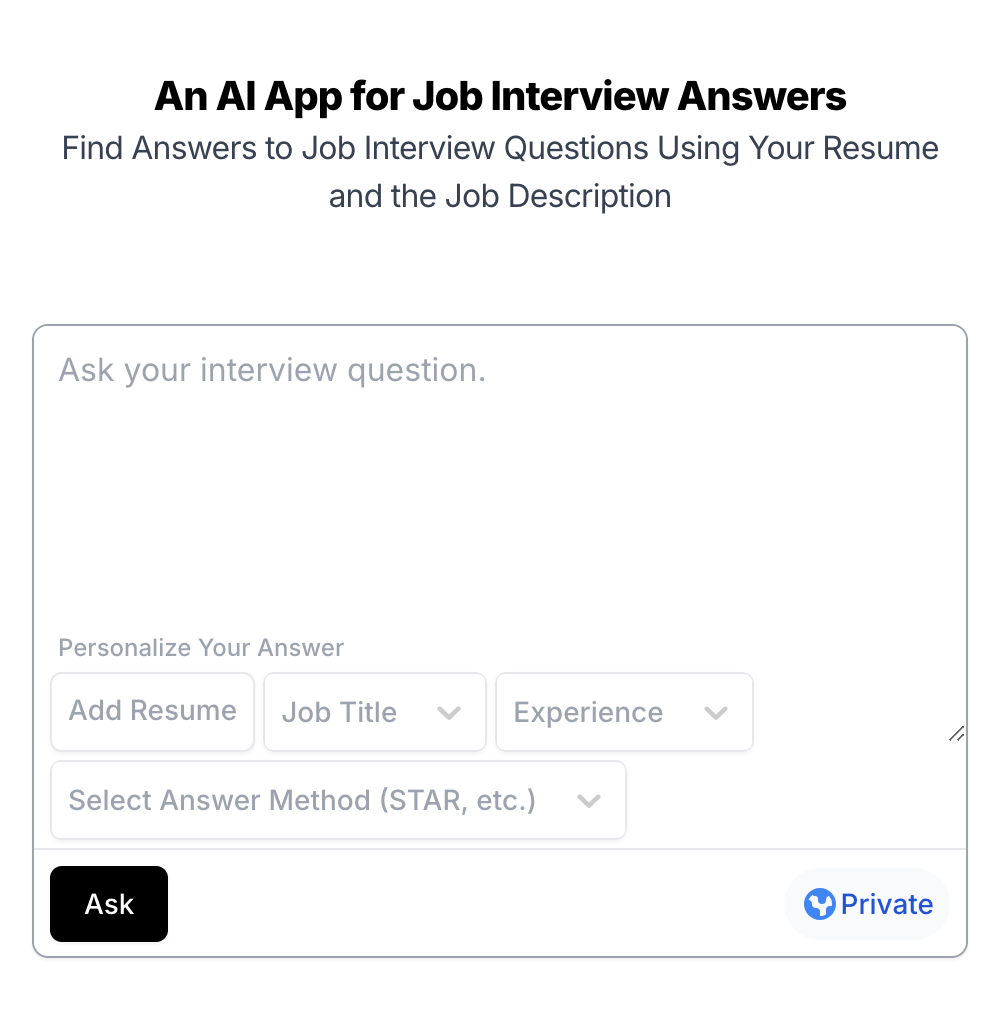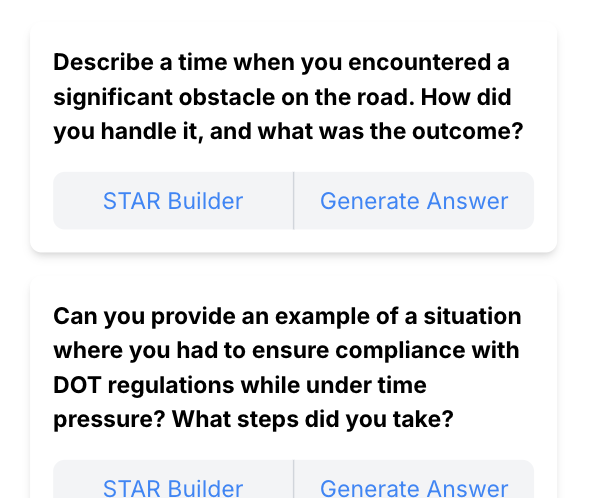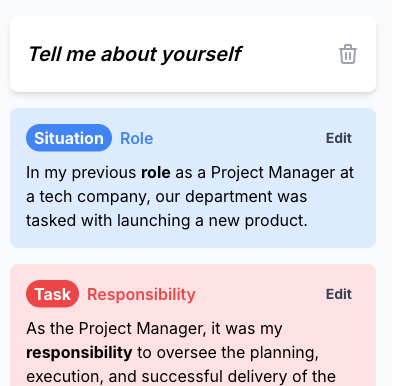
What is a Technical Interview Question? A Simple Guide
Fri Aug 23 2024•Author: InterviewPro AI
Table of Contents
- What Does It Mean?
- Common Technical Interview Questions
- How Long Should Your Answer Be?
- What Not to Say in Your Answer
- What Could They Ask You Next?
- Possible Follow-Up Questions
- When Are These Questions Asked?
- Who Asks This Question?
- How Useful Are These Questions?
- Tips for Answering Technical Questions
- How to Structure Your Answer
What Does It Mean?
Technical questions are used to cross-check that your skills match your resume and job requirements. These questions can be about programming languages, tools, processes, or problem-solving in your field. They check if you have the technical know-how to do the job well.
5 Common Technical Interview Questions
- What programming languages are you comfortable with?
- Can you explain how you would design a database for a specific application?
- How would you troubleshoot a network connectivity issue?
- What's your experience with cloud computing platforms?
- Can you walk me through your process for debugging code?
How Long Should Your Answer Be?
Try to keep your answers to 2-3 minutes for each question. This gives you enough time to show your knowledge without going into too much detail. Your answer will be used to ask more questions, so keep it clear and to the point.
What Not to Say in Your Answer
When answering technical interview questions, avoid these types of responses:
-
Don't be too vague Bad example: "I know a lot about programming." Why it's bad: This doesn't show any specific knowledge.
-
Don't exaggerate your skills Bad example: "I'm an expert in every programming language." Why it's bad: It's unlikely to be true and can make you seem dishonest.
-
Don't give up if you don't know Bad example: "I have no idea. Next question?" Why it's bad: It's better to explain your thought process or ask for clarification.
-
Don't criticize technologies or methods Bad example: "That programming language is outdated and useless." Why it's bad: It can make you seem close-minded or difficult to work with.
-
Don't just recite textbook definitions Bad example: (When asked about OOP) "Object-oriented programming is a programming paradigm based on the concept of 'objects'..." Why it's bad: It doesn't show your understanding or practical experience.
-
Don't go off-topic Bad example: (When asked about databases) "Well, let me tell you about this app I developed..." Why it's bad: It doesn't answer the question and wastes time.
-
Don't use too much jargon without explanation Bad example: "I'd use a NoSQL DB with sharding and implement eventual consistency." Why it's bad: If you can't explain it simply, you might not understand it well.
Show your knowledge clearly, admit when you're unsure, and always demonstrate that you are able to learn and adapt.
What Could They Ask You Next?
After you answer a technical question, the interviewer might want to know more. They could ask about:
-
Practical application: They might want to know how you've used this knowledge in real projects. Example: "Can you give an example of when you used this in your work?"
-
Problem-solving: They could ask how you'd solve a specific problem using your skills. Example: "How would you optimize this algorithm?"
-
Your learning process: They might ask how you stay updated in your field. Example: "How do you keep up with new developments in this technology?"
-
Your preferences: They could ask about your favorite tools or methods. Example: "Which version control system do you prefer and why?"
-
Deeper knowledge: They might ask more detailed questions about the topic. Example: "Can you explain how garbage collection works in Java?"
-
Team collaboration: They could ask how you work with others on technical projects. Example: "How do you handle code reviews in your team?"
5 Possible Follow-Up Questions
- "Can you explain the pros and cons of using this approach?"
- "How would you scale this solution for a larger system?"
- "What alternative methods could you use to solve this problem?"
- "How would you test this solution?"
- "Can you draw a diagram to illustrate your answer?"
When Are These Questions Asked?
Technical questions can come up at different times in the interview process:
-
Initial Screening: Basic technical questions might be asked to check if you have the required skills. Example: "What programming languages do you know?"
-
Technical Interview: This is where most technical questions are asked. It often comes after the initial screening. Example: "Can you write a function to reverse a string?"
-
On-site Interviews: You might face more complex technical questions or coding challenges. Example: "Design a system to handle millions of user requests per second."
-
Final Rounds: You might get questions about how you'd apply your skills to company-specific problems. Example: "How would you improve our current database structure?"
-
Coding Tests: Some companies give separate coding tests before or after the interview. Example: "Here's a link to our online coding platform. Please complete these three challenges."
The order can change depending on the company. Some might start with technical questions, while others save them for later. Normally smaller companies ask technical questions earlier, while larger companies might have multiple rounds of interviews starting with the behavioral questions.
Who Asks This Question?
-
Technical Recruiters: Example: "What's your experience with cloud platforms?"
-
Senior Developers: Example: "Can you explain how you'd implement a binary search tree?"
-
Team Leads: Example: "How do you approach writing maintainable code?"
-
CTOs or Technical Managers: Example: "How would you design a scalable architecture for our product?"
-
Potential Teammates: Example: "What's your preferred method for debugging complex issues?"
-
HR Representatives (for basic technical questions): Example: "Can you list the programming languages you're proficient in?"
The person asking the question usually tailors it to what they need to know about your skills for the job.
How Useful Are These Questions?
Companies use them to find out if your skills match the job requirements and what you wrote on your resume. These questions help employers see if you have the technical skills for the job.
Tips for Answering Technical Questions
- Practice common technical questions in your field
- Explain your thought process as you answer
- Be honest if you don't know something
- Use examples from your past work when possible
- Stay calm and take your time to think before answering
How to Structure Your Answer for Technical Questions
Use this structure for your answers:
- Understand: Make sure you know what the question is asking
- Approach: Explain how you'd solve the problem
- Implement: Describe the steps you'd take or write the code
- Test: Explain how you'd check if your solution works
- Optimize: Discuss any ways to make your solution better
Use Technical questions to your advantage by showing them you know about the topic. Research common questions in your field and practice answering them before your interview.
Can't find what you're looking for?
Try our AI-Powered Interview Preparation Tools
Prepare for your job interview with our AI tools. Tailored answers, custom questions, and STAR method responses.


